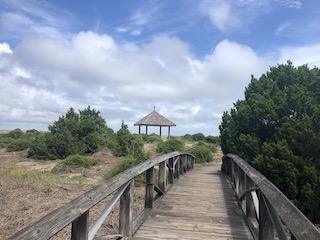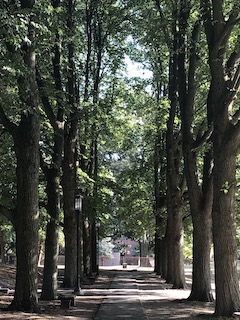Hello again, dear reader! I hope you are well. I took a vacation from posting here, and like any good habit, it is harder to crank back up after you’ve let it drift for a while. If only bad habits would operate in the same way!

Which brings me to these words, attributed to Fr. Pedro Arrupe, SJ (1907-1991), though I don’t think there’s universal agreement on who first wrote this. In any case, I’ve had this little directive on my bulletin board for more than a decade, and every now and then it seizes me afresh.
Fall in Love
Nothing is more practical than
finding God, than
falling in Love
in a quite absolute, final way.
What you are in love with,
what seizes your imagination, will affect everything.
It will decide
what will get you out of bed in the morning,
what you do with your evenings,
how you spend your weekends,
what you read, whom you know,
what breaks your heart,
and what amazes you with joy and gratitude.
Fall in Love, stay in love,
and it will decide everything.
This advice seems abundantly true, and also weirdly cautionary. What are we in love with, truly, madly, deeply? It is, after all, the motivations of our hearts that create our world(s). And what we love one day bleeds into the next, if you know what I mean. And whom we know introduces us to another whole set of experiences, and so on and so on. The ripple effect of our lives will, like it or not, land us in a VERY different spot from where we started out. Not only the vicissitudes of time and happenstance, but the choices we make at every juncture, as way leads on to way.
I’m borrowing that phrase from Robert Frost’s beloved poem “The Road Not Taken,” which might be at once the most quoted, and most misunderstood, poem of our era. More on that here. Suffice it to say that each choice we make, to love or not to love, has ramifying consequences down the line.
The Road Not Taken
Two roads diverged in a yellow wood,
And sorry I could not travel both
And be one traveler, long I stood
And looked down one as far as I could
To where it bent in the undergrowth;
Then took the other, as just as fair,
And having perhaps the better claim,
Because it was grassy and wanted wear;
Though as for that the passing there
Had worn them really about the same,
And both that morning equally lay
In leaves no step had trodden black.
Oh, I kept the first for another day!
Yet knowing how way leads on to way,
I doubted if I should ever come back.
I shall be telling this with a sigh
Somewhere ages and ages hence:
Two roads diverged in a wood, and I—
I took the one less traveled by,
And that has made all the difference.
How can we think about the paths of our lives practically, as Fr. Arrupe says? I have a friend who asks her children this question when they are facing a difficult decision: “which choice will bring you closer to God, and which will take you farther away?” Isn’t that rather clarifying? Though at times very difficult. Another friend told me, when thinking back over her job as a parent, that the hardest calls she had to make, the most unpopular and painful ones in the moment, were often the best decisions in the end.
I’m reminded of Simone Weil’s pronouncement: “When you have to decide to do something, always do what will cost you the most.” This feels kind of forbidding, as if it’s a tactic reserved for advanced practitioners only, as if a cold, tired, but dedicated skier must choose the black-diamond trail, when the bunny slope would be a much easier route to hot chocolate in the lodge.
The “most costly” method sounds good in theory, but maybe it can tread a little too close to martyrdom, which is not a good posture to take in most relationships. I think what Weil is really saying is that when we arrive at a crossroads we should take the way that costs us something heavy we’ve been clinging dearly to, so that we might proceed more honestly and lightly, in step with God.
For me the cheap way out can be hanging on to my own comfort or ease, or not “rocking the boat” when a difficult conversation needs to happen, or indulging an extra hour of pleasure reading when my inner voice/Holy Spirit is clamoring for another more pressing activity in which risk is required. What costs the most might be letting go of the idea of our own agency, the confidence we can fix things ourselves, or that tomorrow we’ll be more ready to start that new spiritual formation practice, because we just don’t feel up to it today.
What does it cost to begin (or continue!) a daily discipline of prayer and meditation? Is it those extra precious morning minutes in bed, or ten minutes scrolling through our phones? I can tell you categorically I do not love my phone. And yet it shapes so much of my day if I let it.
And what does a quick scan of my e-mail reveal about my passions and involvements? If I could take a snapshot of my inbox 10 years ago, would it demonstrate a subtle but profound shift in “what amazes me with joy and gratitude”? I think yes, and I also think, to quote another beloved Frost poem, there are “miles to go before I sleep.” One of the great things about growing older is this opportunity to refine and shape our involvements toward Meaning, whatever the other exigencies of life. There will always be work, unwelcome tasks, and difficult things to deal with, but in the realm of things we can control, shaping our lives based on LOVE seems like the worthiest aim, and infinitely rich in long-term rewards.
I’ve never forgotten the metaphor offered by an SSJE brother when talking about spiritual formation. If we imagine ourselves as ships setting out for a distant shore, even the smallest mid-course correction will land us at the end of the voyage in a VERY different place. This is true in maritime navigation, and it’s true in our lives. The small changes we make now (and it’s never too late to adjust the course) have massive results in the long term, and in the ultimate destination.
In a conversation yesterday a friend shared this verse to consider:
For precept must be upon precept, precept upon precept,
Line upon line, line upon line,
Here a little, there a little.
Isaiah 28:10 (NKJV)
Another way to go about finding God is this idea that praying shapes believing. (More about the book of the same title here.) Day upon day, year upon year, we are building up our life and relationship with God, deepening in power and wonder. Once we develop it as a habit, it’s not even that hard. It can become necessary, automatic, and very fruitful. We can all of us, each of us, choose more and more based on our deepest commitments and heart’s desires. And what is especially apparent in our lives: no special expertise is required to fall in love!


1 Comment. Leave new
Leslie, thanks for sharing the David Orr piece. Crazy how so many of us still get it wrong!! It was good to be reminded of how we tend to deceive ourselves “when constructing the story of our own lives”, always assuming that our current position is the product of our individual actions and choices. The poem is not dissimilar to a Zen Koan. If only its wider readership took the challenge that Frost sets up for us to reexamine our habits, desires, and fears. MAYBE things would be different with one choice, MAYBE not … but I agree with you that shaping our lives based on LOVE is a good aim. Then let the “here a little, there a little” play out into life’s unfolding.